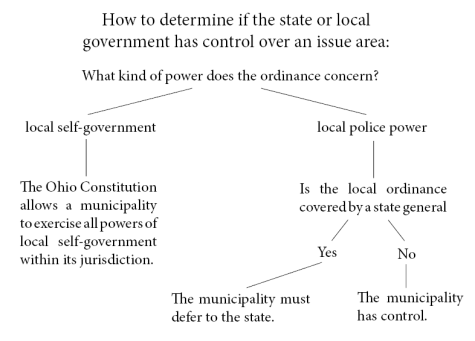State challenges city power over local issues
The state passed a law forbidding cities such as Oxford from banning polystyrene takeout food containers like these.
April 15, 2022
Oxford businesses will again be permitted to use polystyrene containers after the Ohio General Assembly permanently prohibited local governments from banning them.
Oxford City Council originally voted to ban polystyrene containers, commonly known by the brand name Styrofoam, in February 2020, and the containers were to be phased out by the end of 2021. However, the Ohio Legislature passed a law later in 2020 that limited the ability of local governments to regulate single-use plastics, which superseded Oxford’s ban. This state law expired in January 2022.
Oxford city officials recently discovered that the Ohio Legislature passed a permanent ban on the regulation of single-use plastics in the state budget that was passed in the summer of 2021.
“You have 132 state legislators — 99 representatives and 33 senators — make a blanket decision for over 900 Ohio cities and villages on a matter that they felt should be in the budget bill,” Oxford City Manager Doug Elliott said. “Here is an example of the state first violating the constitutional rule limiting legislative bills to a single subject, because I don’t see how it at all relates to the state budget; and secondly, pre-empting our ability to decide what’s right in our community.”
He said he wants to assure Oxford citizens that their local government would never make such an “egregious” decision to tack on anything to legislation that had nothing to do with the rest of the legislation like the state did when throwing this ban into the budget.
Matthew Arbuckle, an assistant teaching professor in Miami University’s Political Science Department, specializes in both federalism and environmental policy. He discussed the competing powers of state and local governments in Ohio.
“Cities can be very active in environmental policy,” Arbuckle said. “Traditionally, cities have flexibility and autonomy to enact environmental policy, as long as the impact doesn’t go beyond their borders.”
Oxford is still encouraging local businesses to find alternative materials to polystyrene for takeout containers. Sustainability is one of the top three priorities that City Council adopted for 2022.
“I think one could say that for the last decade we’ve seen efforts by the state legislature to erode home rule power,” Oxford Law Director Christopher Conard said. Elliott said he agrees.
Arbuckle defines home rule as the ability of local governments to do anything that they are not expressly forbidden from doing in the constitution.
According to an informational brief prepared for the Ohio General Assembly in February 2020, “Because these powers originate in the (Ohio) Constitution, laws passed by the General Assembly that interfere with them may be invalid as applied to municipal corporations unless those laws are sanctioned by other provisions of the Constitution.”

Elliott said another example of this is a bill currently being debated in the legislature, House Bill 563. This bill prohibits any county, township or municipality from prohibiting short term housing rentals, or regulating their “number, duration or frequency.”
“Ohioans should always have the right to use what is often their most valuable asset, their homes, as an investment to make money through short-term rental,” Sarah Fowler Arthur, one of the original sponsors of the bill, said in a press release. “Short-term rentals also help drive traffic to countless small businesses – restaurants, shops and tourist attractions – across the state. Eliminating short-term rentals hurts Ohio’s economy.”
Currently, Oxford requires all short term rentals to register with the city and to undergo inspections to ensure the property is compliant with the safety measures required for short term rentals. Oxford currently does not prohibit any short term rentals, although some municipalities across the state do.
Beginning in January, a city ordinance went into effect that includes short term rentals in the city’s 6% lodging tax. Half of this goes to Enjoy Oxford, the city’s visitors’ bureau, and the other half goes into a Housing Trust Fund, which will be used to support affordable housing projects.
If H.B. 563 went into effect, Conard said it is unclear if this tax could go forward.
This bill is co-sponsored by Thomas Hall, whose district includes Oxford.
The prohibition on a polystyrene ban may be final, but H.B. 563 is still under consideration. Elliott said his advice to the legislature is to “leave this matter up to the local governments to decide what’s best in their community. I don’t believe that our regulations were overbearing.”














